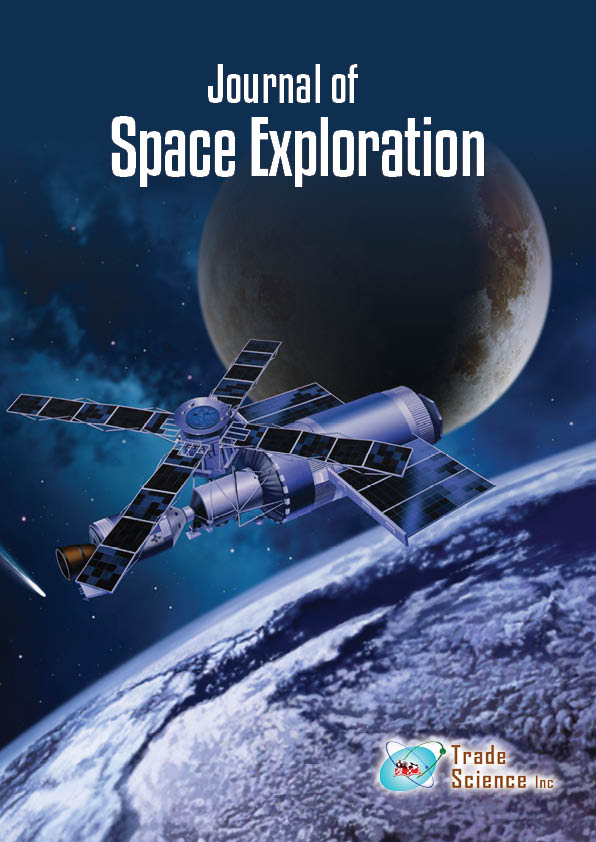Review
, Volume: 10( 3)Effects of Microgravity on Human Health
- *Correspondence:
- Mahima Chawdhury
School of Pharmaceutical Sciences, Lovely Professional University, Punjab, India
E-mail: mahima2chowdhury@gmail.com
Received: March 12, 2021; Accepted: March 15, 2021; Published: March 23, 2021
Citation: Mahima C. Effects Of Microgravity on Human Health. J Space Explor. 2021;10(5):168.
Abstract
After sending a number of spacecraft in the zone of microgravity with astronauts, it becomes important for us to know about the different health hazards that follow. Some of which may be short while the impact of others might be lifelong and detrimental to one's health. Effects such as motion sickness,changes in vision, motor incoordination, skeleto-muscular problems, cardiovascular problems, skin allergies etc. are documented for the astronauts entering into the microgravity. This study is important since a number of useful experiments are carried out in space, but for which we need to prioritize the health of our people. In order to alleviate the pain and suffering studies are carried out.
Keywords
Microgravit; Astronauts; Experiments; Health
Introduction
A very common question about space is whether there is gravity present in space or not. To explain this one can say that there is very little gravity present everywhere in space. Microgravity, as the name indicates, means very little amount of gravity. Astronauts who appear to float in space are due to the presence of microgravity. Microgravity makes any object appear to be weightless. This makes movement of very heavy equipment in space quite easy [1].
Although movement becomes easy there are numerous health implications that follow. The entire system of the body changes with the entry in the microgravity region. Most of these changes comes back to normal as soon as the body returns to normal environment, but there are certain changes/effects that continues to follow for a longer duration of time [2].
From a medical point of view, it is very important to study cells when exposed to microgravity, since certain cells have proven to work more efficiently in micro gravitational conditions compared to that of normal conditions [3]. Like the endothelial cell culture in space is much more better in space compared to that of earth since it can be done for a longer time and they grow better and in more three dimensional fashion [2].
Microgravity-Ideal for Conducting Biological Experiments
There are a number of factors that favours a number of biological experiments to be conducted in microgravity [2]. This accounts for the reason that cell growth is different in space as compared to that of earth [1].
Scientists have said that one of the most fascinating things to watch is the protein crystal experiment in space. The protein here is the one that is used as a Parkinson's disease drug by pharmaceuticals. It is noted that these proteins grow better in a 3-dimensional structure since they are no more restricted to the 2-dimensional plate. It is also because of the absence of convective currents in space which promotes the growth of cells and scientists have also claimed that they get a 30% better insight of the protein structure. Due to this reason scientists have claimed that within few years there might be chances of better treatment of Alzehmir’s disease an d parkinson’s disease in space [2].
Another scope that is widely seen is the aging process in space. The process which takes years down on Earth occurs in a fraction of minutes up in the microgravity. The bone aging process is one of the most noticeable one. This change can be observed with the help of molecular markers that change their orbit with time [2].
One of the most important experiments that are conducted in space is the culture of the cells that line the blood and the lymphatic vessels (Endothelial cells). This is because cell growth is different in space, the scientists are able to conduct the experiments for a longer time in space. Also, the three dimensional aspect helps them to study cells more closely [2].
A number of biological researches has also been carried out on rats and mice in order to understand the effect of microgravity on humans.Like the loss of skeletal and muscle strength was observed and scientists have put in a unique mechanism to revert the skeletal muscle atrophy [3].
Effects on Bodily Function in Microgravity
Astronauts who have lived in space stations have explained that microgravity affects the body in numerous ways [1]. The astronauts entering the spacecraft experiences discomfort during three periods:
• During the entry in microgravity (initial response)
• On exposure to microgravity (during the stay)
• On returning back leaving the microgravity and entering back to gravity [4]
Talking about the discomforts, Nausea is the first and foremost symptom that appears once someone enters the microgravity [2]. There are chances of discomfort that can be felt during the landing and take off of the spacecraft which they call the motion sickness [3]. This is because of the otolith asymmetry between the left and the right ears [4]. Astronauts have also claimed that the body feels different for the first few days, the stomach doesn't seem to feel very good and there is hardly any appetite. Although this condition seems to revert back to normal as days pass by.This is sometimes followed by conditions of eyes felt by some of the astronauts, where they've mentioned that there is swelling of the optic nerve, changes in shape of eyeball is also noticed which changes the vision [2]. This accounts for one of the most serious health problems that affects the crewmembers. It is studied that there is a structural and functional damage of the eyes that is described by the disruption of blood-retinal barrier and the ocular disruption [3].
Other than that, a serious ailment that was noticed was that the astronauts tend to face problems in the bones and muscle due to the absence of gravity [1]. Scientists have explained this phenomenon to be due to the rapid aging process in space. The human body is more prone to have osteoporosis in microgravity than on earth [2]. The main cause for bone fragility is due to the loss of calcium which might on return of the astronaut cause renal stones due to hypercalcemia [4]. There may be postural defects that may retain for a longer period of time in case of longer stay in space, due to the absence of gravity [3]. Muscular loss is primarily due to the absence of muscular constraints followed by absence in muscular movements [4]. It is said that the body is more prone to the risk of opportunistic infection due to the increase in immunosuppression in spaceflight. Scientific research has also indicated that astronauts face hypersensitivity in the skin that causes skin allergies. Moreover, one of the most dangerous consequences of being exposed to ionizing radiation that might inculcate the risk of death due to cancer or cardiovascular disease in due course of time [3]. ‘Cardiovascular defunctioning’ is noticed when there is a fluid shift in the cardiovascular system takes place which causes decrease in the circulatory blood volume, cardiac size and aerobic capacity [5].
Conclusion
Thus there are several deconditioning of neurovestibular, cardiovascular, ocular, musculoskeletal and bone metabolics that have been reported. Scientists are trying to improve these conditions so that further space research can be carried out in microgravity without the inconvenience that is faced by the astronauts, artificial gravity being one among that. They are trying to create similar conditions on earth in order to compete with the weightlessness of microgravity.Gravitational biology is thus very important since it helps us gain more knowledge about the problems that are faced by the crewmates.
References
- Wolfe JW, Rummel JD. Long-term effects of microgravity and possible countermeasures. Adv Space Res. 1992;12(1):281-4.
- Yiannopoulou KG, Papageorgiou SG. Current and future treatments for Alzheimer's disease. Ther Adv Neurol Disord. 2013;6(1):19-33.
- Grimm D. Guest Edited Collection: Gravitational biology and space medicine. Sci. Ntr. 2019;9(3):14399-420.
- Nelson ES, Mulugeta L, Myers JG. Microgravity-induced fluid shift and ophthalmic changes. Life (Basel). 2014;4(4):621-65.
- Mader TH, Gibson CR, Miller NR, et al. An overview of spaceflight-associated neuro-ocular syndrome (SANS). Neurol India. 2019;67(Supplement):S206-S211.

